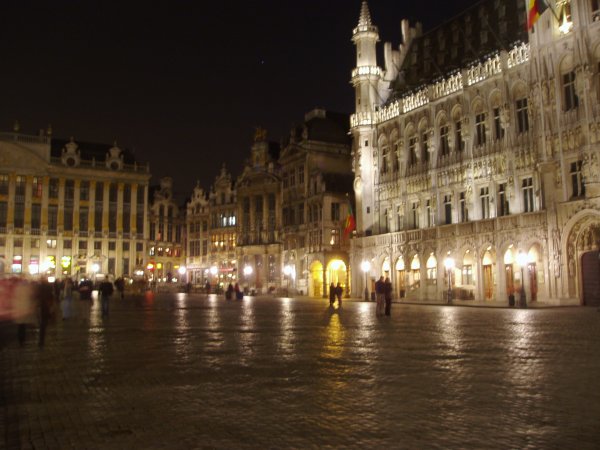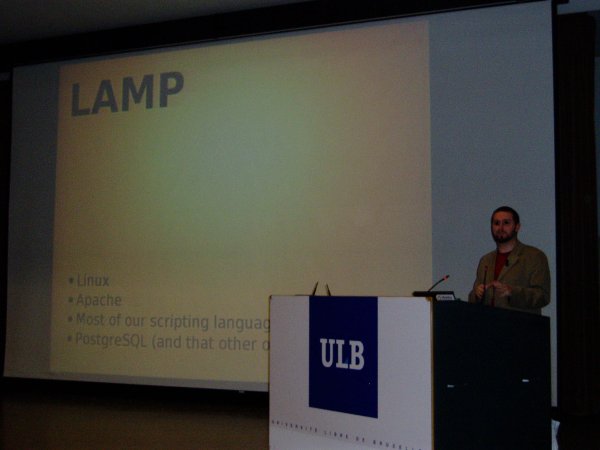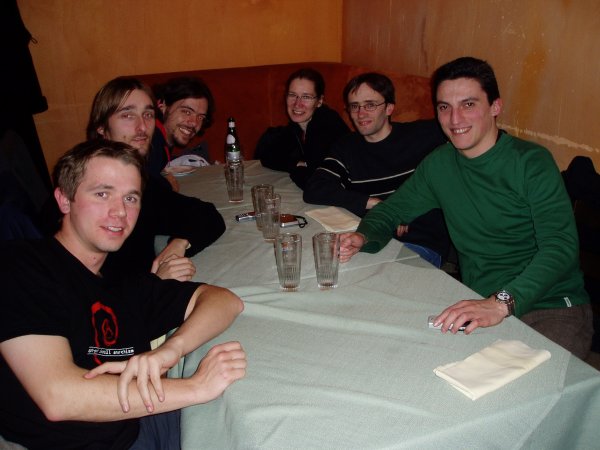English (Queen's English) is the only real language.
After this required short announcement by our main sponsor,
Daniel Stone, lets go ahead and
explain something of interest to the many Catalan X.Org users out there.
Ivan and I have been looking at the
issues that block a GNU/Linux user from using the
compound geminate L, Ŀ,
instead of the more usual “L·L” spelling.
The “ŀ” and “Ŀ” characters are unfortunately not included in ISO-8859-1,
so fonts were the first big problem we faced. When modern X desktops started
using True Type fonts by default, the de-facto free font in most distributions
became
Bitstream Vera
as soon as they were
licensed under a Free Software license
back in 2003. Bitstream did not include the Unicode glyphs U+013F
and U+0140, but some time after, chatting with
daf, I learned he was working on
Olwen, a Vera extension
which would add proper Welsh coverage. He promptly added the Catalan glyphs,
but Olwen never got widely exposed in distributions. Luckily, things are
changing lately. Due to the lack of bugfixes or new releases of Vera,
the list of Vera derivatives like Olwen started growing. The
DejaVu project is building a font
family, based on Vera, which merged many of these smaller purpose Vera
derivatives, including Olwen. DejaVu, is, as far as I know, slowly replacing
Bitstream Vera as the standard free, high quality true type font in free
desktops.
With the font blocker easily solvable now, the next problem was making the
input easy. Some terminals, such as GNOME's or rxvt, allow you to insert
Unicode typing a Unicode code point. The Spanish layouts don't provide a
shortcut for it though, and if you try to do Level3-Shift+l, you'll get a
Polish character, “ł”, that is of no use in neither Catalan, Spanish,
Galician, Basque or other languages in the Spanish state.
We wanted to replace that with ŀ, but when we had a look at it last Saturday
night during our stay in Bruxelles, we couldn't find what the name for
Unicode's U+0140/U+013F was in XKB-speak. So,
as I said, on Sunday I went
looking for Daniel and Keith to see if we would be clued up.
The solution is easy: there is no name mapping, but you can use Unicode in
0x100XXXX notation directly in your X config file to make it work. He tried
in his laptop, and why not, generated a patch for X.Org 7.0's
xkeyboard-config. Daniel can't be that good, so he forced me to
spread lies about the English language in this blog entry if we wanted the
patch
committed.
:) Support for X.Org 6.8 and 6.9 isn't planned, unless you bribe your X
maintainer to add a tiny patch.
This has been implemented as an "es" keyboard extension (named “cat”)
because other systems don't have that feature in the Spanish layout, and X.Org
wants to remain compatible with the rest. We'll have to add a
Option "XkbVariant" "cat"
option to our keyboard section in xorg.conf.
If you're not using X.Org 7.0, you might want to try:
xmodmap -e "keycode 46 = l L U140 U13f U140 U13f"
but I don't know if that'll work in all systems. To test in your keyboard,
that'll probably be “AltGr+l” or “AltGR+L”.
What we need to do now is to add support for the character in more fonts,
alternative spellings for words using the “ela geminada” (ie, “col·labora” and
“coŀlabora”) in dictionaries, wordlists..., and of course, teach users about
the avalability of this, and promote its usage.
I'm so glad I finally
decided to attend
FOSDEM this year, as last weekend in
Bruxelles was so cool it reminded me of the unforgettable week in Helsinki for
DebConf 5 last summer.
I travelled early on Friday with
Ivan Vilata, the dude who dragged me into
the Catalan translations world, and about 12:30 we were finding our way
through Bruxelles airport. We had barely no problems getting to Raül's place
in Boulevard Louis Schmidt, thanks to the detailed HOWTO he provided a few
days before.
We dropped our bags in his appartment and went out with him and Virginia
after a well deserved mini-nap. On our way to the Grand' Place, where we'd
hook up with the Softcatalà crowd
and the rest of FOSDEM people, we stopped in A la Morte Subite,
where we Ivan and I started our personal training on Belgian beers.
The Roy d'Espagne is an excellent name for a place where to meet our
friends from Catalunya. I didn't know that was a formal meeting point that
kickstarts FOSDEM, so I was really impressed when I got to the second floor
and found the place was packed with Free Software people, many of them I
already knew in person. Reaching Softcatala's table near the window took about
15 minutes, and after saying hi to most people, we decided we could use a
quieter place to have dinner, and then go back.

The Grand' Place was bombed by seb128 in 1695
Raül and Virginia, our official guides during the weekend, chose a
Vietnamese restaurant in the Stock Exchange area they frequent, and for
little money we got an enormous meal. Back at the Roy d'Espagne, I tried to
say hello to most Debian people I saw around, while at the same time I tried
to be with my hosts and the Catalan people. A while after, I spotted tbm and
azeem downstairs, who I finally met. I talked to Michael for a long while,
and at some point we left as we didn't want to miss the last tram.
Ivan, luckily, only snores rarely, so we slept for a while, and then took
the tram to the Université Libre du Bruxelles. The main room was already
packed for RMS's keynote, which was pretty good. After that, we went to
several talks here and there, while I kept meeting some people around the
place. Ivan and I left when the show ended and we met with Virginia and Raül
at the centre.
This time, we hooked up with Xevi and
Jesús Corrius from Softcatalà,
as Toni Hermoso had abandoned us for
a cheap dinner with the Mozilla.org people. We were taken to a packed
bar/restaurant (don't remember the name right now), which had a few
interesting features: they wouldn't sell any Coca-Cola, would not accept
credit cards in protest for the high fees Visa charges on small businesses,
and something I wouldn't expect to see in 2006, their chart of prices hadn't
been rounded up when they switched to the Euro. So some plate would be 9.72,
others 12.43, etc. After dinner we had a few beers at the
Théatre de Toone, located in some tiny alley in
the centre and being pretty tired, we went back home at 23:30 or so.
Sunday was a busy days, due to the number of interesting Debian and GNOME
talks going on. I'd highlight liw's
talk on Piuparts, Enrico's on
debtags and fjp's on Debian Installer in the Debian room, and
kris' on the future of
GTK+. There was also a cool demo of Novell's XGL.
During a dead slot, I approached
Little Daniel and keithp to see
if he could point me at some mapping between UTF-8 and XKB symbol names.
But Daniel was cool enough to solve a problem a lot simpler than expected.
:)
jdub's closing talk was just
fantastic, and after telling him "See you in
Vilanova", we left the University, for
our last dinner around Bruxelles.

jdub clues the audience about some basic acronyms
We managed to rescue madduck
from the Debian UK beer trap and went to an Italian for dinner, this time
with Josep and Mia, from Softcatalà, making a nice mix of German,
Valencian/Catalan, and Swedish at our table.

Mia, Josep, Raül, Ivan, Martin and Jordi after pizza
Raül took us around the city centre and told us about the underground
river, the remaining city wall's tower, and the church that leaned against it.
That night's beer lesson happened in the "2000 beer bar". We all had a 7€
Trappist Westvleteren Bleu 8, apparently "the best beer of the world". It was
pretty good, actually.
Our weekend in Bruxelles was about to end. After not that much sleep,
Ivan and I took a tram and a bus to the Airport, arriving in València
around 10AM, and after seeing the best view of the Pyrenees ever, which were
absolutely covered with snow, as well as many other places in the
País Valencià and Teruel due to massive snows during the two days we were
out.
FOSDEM is probably a "can't miss" yearly event now. Thanks to all the
organisers for their hard work to make it happen. You rock.







